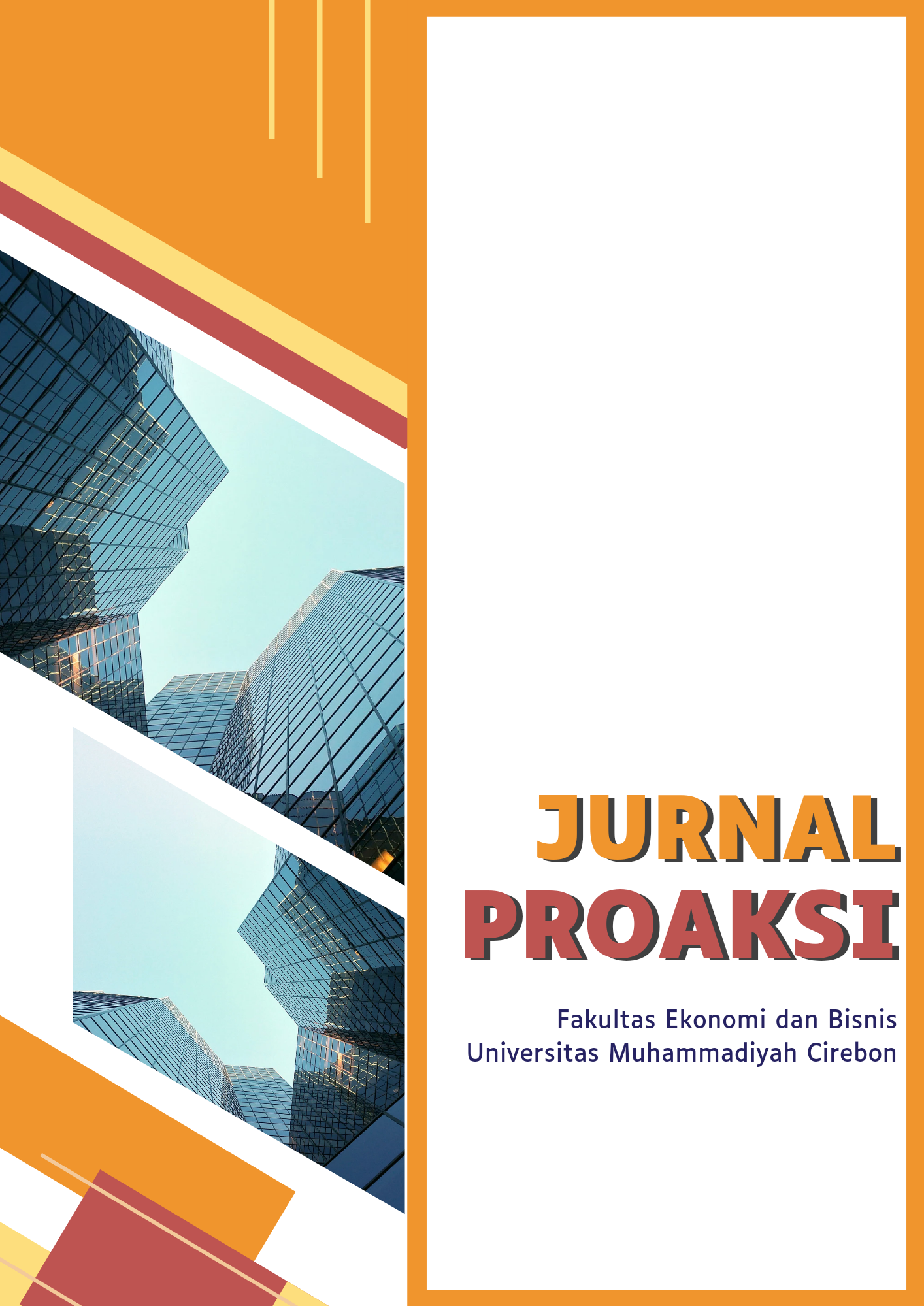Motivasi, Refleksi, dan Konteks: Memahami Kesadaran Kewirausahaan Gen Z di Perguruan Tinggi
DOI:
https://doi.org/10.32534/jpk.v12i3.7152Kata Kunci:
Entrepreneurial Awareness, Generation Z, Phenomenological Study, Reflective Learning, Youth EntrepreneurshipAbstrak
Tujuan Utama – Penelitian ini bertujuan untuk mengeksplorasi bagaimana mahasiswa Generasi Z di Indonesia membentuk kesadaran kewirausahaan melalui pengalaman hidup, motivasi, dan konteks sosial.
Metode – Penelitian ini menggunakan desain kualitatif dengan pendekatan analisis fenomenologis interpretatif (IPA). Data dikumpulkan melalui wawancara mendalam semi-terstruktur terhadap tiga mahasiswa yang memiliki minat dalam kewirausahaan.
Temuan Utama – Temuan menunjukkan tiga tema utama: motivasi internal, pengalaman reflektif, dan faktor kontekstual. Partisipan terdorong secara intrinsik oleh nilai otonomi, pertumbuhan pribadi, dan kontribusi sosial, sementara pengalaman reflektif membentuk kesadaran diri kewirausahaan mereka. Dukungan dari keluarga, teman sebaya, dan institusi menjadi faktor penting yang memperkuat perjalanan kewirausahaan mereka.
Implikasi Teoretis dan Praktis – Studi ini merekomendasikan agar pendidikan kewirausahaan mengintegrasikan pembelajaran reflektif dan pengalaman untuk sejalan dengan identitas dan motivasi Gen Z. Institusi juga perlu menyediakan sistem dukungan yang terarah guna menumbuhkan wirausaha muda yang berorientasi pada nilai.
Kebaruan – Penelitian ini menawarkan perspektif multidimensional terhadap pembentukan kesadaran kewirausahaan pada Generasi Z dengan menggabungkan makna personal dan pengaruh sosial budaya.
Kata kunci: kesadaran kewirausahaan, Generasi Z, studi fenomenologis, pembelajaran reflektif, kewirausahaan muda
Unduhan
Referensi
Ahmed, T., J. E. Klobas, V. G. R. Chandran, M. W. Akhtar, and B. S. Sergi. 2025. “How Perceived Contextual Barriers for Entrepreneurship Reduce Entrepreneurial Intentions: A TPB Study.” International Entrepreneurship and Management Journal 21(1). https://doi.org/10.1007/s11365-024-01047-4.
Ajzen, Icek. 1991. “The Theory of Planned Behavior.” Organizational Behavior and Human Decision Processes 50(1):179–211. https://doi.org/10.47985/dcidj.475.
Alamanda, D. T., V. Gaffar, P. D. Dirgantari, and G. Anggadwita. 2022. “Identifying Factors of Startups Creation by Indonesian Gen Z in Post-Pandemic Era.” Pp. 424–29 in 2022 10th International Conference on Information and Communication Technology, ICoICT 2022.
Botha, Melodi, and Sphumelele Sibeko. 2024. “The Upside of Narcissism as an Influential Personality Trait: Exploring the Entrepreneurial Behaviour of Established Entrepreneurs.” Journal of Entrepreneurship in Emerging Economies 16(3):469–94. https://doi.org/10.1108/JEEE-09-2021-0340.
Caglayan, E., E. B. Ucel, Esin Ça?layan, Ela B. Uçel, E. Caglayan, and E. B. Ucel. 2023. “Entrepreneurship in Times of Adversity Through the Lens of University Students.” Vision. https://doi.org/10.1177/09722629231172038.
Cao, Y., M. M. Asad, L. Wang, A. Naz, and N. Almusharraf. 2022. “Role of Personality Traits for Entrepreneurial Intentions of Young Entrepreneurs: A Case Study of Higher Education Institution.” Frontiers in Psychology 13. https://doi.org/10.3389/fpsyg.2022.1010412.
Chahal, Jyoti, Muhammad H. Shoukat, and Rami Ayoubi. 2024. “How Entrepreneurial Environment and Education Influence University Students’ Entrepreneurial Intentions: The Mediating Role Of Entrepreneurial Motivation.” Higher Education Skills and Work-Based Learning 14(3):591–609. https://doi.org/10.1108/HESWBL-10-2022-0206.
Colombelli, A., S. Loccisano, A. Panelli, O. A. M. Pennisi, and F. Serraino. 2022. “Entrepreneurship Education: The Effects of Challenge-Based Learning on the Entrepreneurial Mindset of University Students.” Administrative Sciences 12(1). https://doi.org/10.3390/admsci12010010.
Dreyer, Christian, and Hana Stojanová. 2022. “How Entrepreneurial Is German Generation Z vs. Generation Y? A Literature Review.” Procedia Computer Science 217:155–64. https://doi.org/10.1016/j.procs.2022.12.211.
Gielnik, M. M., H. Zacher, and M. Wang. 2018. “Age in the Entrepreneurial Process: The Role of Future Time Perspective and Prior Entrepreneurial Experience.” Journal of Applied Psychology 103(10):1067–85. https://doi.org/10.1037/apl0000322.
Hägg, Gustav, and Agnieszka Kurczewska. 2020. “Towards a Learning Philosophy Based on Experience in Entrepreneurship Education.” Entrepreneurship Education and Pedagogy 4(1):129–53. https://doi.org/ 10.1177/2515127420910679.
Hanandeh, R., S. M. A. Alnajdawi, A. Almansour, and H. Elrehail. 2021. “The Impact of Entrepreneurship Education on Innovative Start-up Intention: The Mediating Role of Entrepreneurial Mind-Sets.” World Journal of Entrepreneurship, Management and Sustainable Development 17(4):856–71. https://doi.org/10.1108/WJEMSD-02-2020-0016.
Hassan, A., I. Anwar, I. Saleem, K. M. B. Islam, and S. A. Hussain. 2021. “Individual Entrepreneurial Orientation, Entrepreneurship Education and Entrepreneurial Intention: The Mediating Role of Entrepreneurial Motivations.” Industry and Higher Education 35(4):403–18. https://doi.org/10.1177/09504222211007051.
Jiatong, W., Majid Murad, Fu Bajun, Muhammad S. Tufail, Farhan Mirza, Muhammad Rafiq, Jiatong Wang, Majid Murad, Fu Bajun, Muhammad S. Tufail, Farhan Mirza, Muhammad Rafiq, W. Jiatong, Majid Murad, Fu Bajun, Muhammad S. Tufail, Farhan Mirza, and Muhammad Rafiq. 2021. “Impact of Entrepreneurial Education, Mindset, and Creativity on Entrepreneurial Intention: Mediating Role of Entrepreneurial Self-Efficacy.” Frontiers in Psychology 12. https://doi.org/10.3389/fpsyg.2021.724440.
Kamdi, Waras, Muhammad Makky, Hendra Hidayat, and Yuni Rahmawati. 2024. “Entrepreneurship Education and Entrepreneurial Intention among University Students: The Roles of Entrepreneurial Mindset, Digital Literacy, and Self-Efficacy.” Journal of Social Studies Education Research 15(4):85–134.
Khalil, H., K. F. Hashim, S. Atallah, and M. Rababa. 2024. “Shaping the Entrepreneurial Mindset: Exploring the Impact of Entrepreneurship Education on Entrepreneurial Intentions among University Students in the UAE: The Mediating Role of Individual Entrepreneurial Orientation.” International Journal of Educational Research 127. https://doi.org/10.1016/j.ijer.2024.102430.
Krueger, N., S. Mestwerdt, and J. Kickul. 2024. “Entrepreneurial Thinking: Rational vs Intuitive.” Journal of Intellectual Capital 25(5–6):942–62. https://doi.org/10.1108/JIC-11-2023-0265.
Li, L., K. Kang, and Y. Feng. 2024. “Parents’ Effects on Chinese Students’ Digital Entrepreneurship Motivation on Live Streaming Platforms: Regional Perspective Using Multi-Group Analysis.” Journal of Entrepreneurship in Emerging Economies. https://doi.org/10.1108/JEEE-09-2023-0372.
Lincoln, Yvonna S., and Egon G. Guba. 1985. Naturalistic Inquiry. Beverly Hills, CA: Sage Publications.
Lindberg, E., H. Bohman, P. Hulten, and T. Wilson. 2017. “Enhancing Students’ Entrepreneurial Mindset: A Swedish Experience.” Education and Training 59(7–8):768–79. https://doi.org/10.1108/ET-09-2016-0140.
Maritz, A., Q. Nguyen, and S. Ivanov. 2022. “Student Entrepreneurship Ecosystems at Australian Higher Education Institutions.” Journal of Small Business and Enterprise Development 29(6):940–57. https://doi.org/ 10.1108/JSBED-11-2021-0466.
Morris, Michael H., Donald F. Kuratko, Minet Schindehutte, and April J. Spivack. 2012. “Framing the Entrepreneurial Experience.” Entrepreneurship Theory and Practice 36(1):11–40. https://doi.org/10.1111/j.1540-6520.2011.00471.x.
Mujtaba, G., S. N. A. Zulkiffli, S. F. Padlee, W. N. Mohamed, and N. K. A. Sukri. 2025. “Impact of Entrepreneurial Inspiration, Awareness, and Skills on University Students’ Entrepreneurial Intentions: The Mediating Role of Entrepreneurial Education.” Administrative Sciences 15(1). https://doi.org/ 10.3390/admsci15010015.
Nasip, Sorayah, Sharifah R. Amirul, Stephen L. Sondoh, and Geoffrey H. Tanakinjal. 2017. “Psychological Characteristics and Entrepreneurial Intention.” Education + Training 59(7/8):825–40. https://doi.org/10.1108/et-10-2015-0092.
Nayak, P. M., H. G. Joshi, M. Nayak, and M. T. Gil. 2024. “The Moderating Effect of Entrepreneurial Motivation on the Relationship between Entrepreneurial Intention and Behaviour: An Extension of the Theory of Planned Behaviour on Emerging Economy.” F1000Research 12. https://doi.org/ 10.12688/f1000research.140675.2.
Oulhou, H., and A. Ibourk. 2023. “Perceived Effectiveness of Entrepreneurship Education, Entrepreneurial Mindset, Entrepreneurial Self-Efficacy and Entrepreneurial Intention among Moroccan University Students: A Correlational Study.” Social Sciences and Humanities Open 8(1). https://doi.org/ 10.1016/j.ssaho.2023.100719.
Qi, R., D. Wang, Y. Yang, and F. Wu. 2023. “How Does Environmental Perception Affect the Willingness of University Students to Return Home to Start a Business?” Cogent Business and Management 10(3). https://doi.org/10.1080/23311975.2023.2288720.
Rohanaraj, T. T. A. 2023. “A Systematic Literature Review on The Transformation of Entrepreneurial Intention to Entrepreneurial Action.” ECONOMICS - Innovative and Economics Research Journal 11(s1):121–39. https://doi.org/10.2478/eoik-2023-0063.
Saeedikiya, Mehrzad, Aidin Salamzadeh, Yashar Salamzadeh, and Zeynab Aeeni. 2023. “Cognitions Affecting Innovation Among Generation Z Entrepreneurs: The External Enablement Of Digital Infrastructure.” International Journal of Entrepreneurial Behaviour & Research 30(2/3):572–608. https://doi.org/ 10.1108/ijebr-02-2023-0188.
Sefiani, Yassine, and Barry J. Davies. 2025. “Exploring Entrepreneurial Motivations among Saudi Female Business Undergraduates.” Management and Sustainability 4(1):81–104. https://doi.org/10.1108/MSAR-06-2023-0029.
Smith, Jonathan A., Paul Flowers, and Michael Larkin. 2009. Interpretative Phenomenological Analysis: Theory, Method and Research. London: SAGE Publications.
Suryaborneo.com. 2020. Kewirausahaan Di Kalangan Generasi Muda: Temuan Dari Survei Nasional. The SMERU Research Institute.
Vivekananth, S., L. Indiran, and U. H. A. Kohar. 2023. “The Influence of Entrepreneurship Education on University Students’ Entrepreneurship Self-Efficacy and Entrepreneurial Intention.” Journal of Technical Education and Training 15(4):129–42. https://doi.org/10.30880/jtet.2023.15.04.011.
Weligodapola, M., R. S. Weerarathna, K. G. K. Hansini, P. H. G. W. Ravini, W. G. T. P. Sarathchandra, and S. M. D. P. D. Samarathunga. 2023. “Personality Traits Empower Entrepreneurial Intention of Generation Z in Sri Lanka.” Journal of Innovation and Entrepreneurship 12(1). https://doi.org/10.1186/s13731-023-00349-1.
Willis, Chris H., Connie Merriman, Anil Nair, and Ashley C. Fournet. 2025. “Innovative Extracurricular Student Engagement: The Community Problem Solving Challenge.” Entrepreneurship Education and Pedagogy 8(1):40–59. https://doi.org/10.1177/25151274241232355.
Yi, Gaofeng. 2017. “Impact of Internship Quality on Entrepreneurial Intentions Among Graduating Engineering Students of Research Universities in China.” International Entrepreneurship and Management Journal 14(4):1071–87. https://doi.org/10.1007/s11365-017-0491-2.
Zanabazar, A., M. Ukhnaa, and D. Bavuudorj. 2025. “The Mediating Role of Entrepreneurial Self-Efficacy in the Relationship between Entrepreneurial Mindset and Intention among Mongolian University Students.” International Journal of Advanced and Applied Sciences 12(2):158–68. https://doi.org/ 10.21833/ijaas.2025.02.018.
Zhang, J., J. Huang, and Y. Hong. 2022. “Attitudes Toward Entrepreneurship Education, Post-Pandemic Entrepreneurial Environment, and Entrepreneurial Self-Efficacy Among University Students.” Frontiers in Psychology 13. https://doi.org/10.3389/fpsyg.2022.758511.
Unduhan
Diterbitkan
Terbitan
Bagian
Lisensi
Hak Cipta (c) 2025 Achmad Iqbal, Farida, Alawia

Artikel ini berlisensi Creative Commons Attribution 4.0 International License.




















